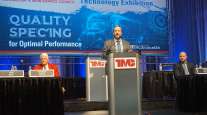5 Questions: Greg McQuagge, U.S. Xpress

[Find the latest in equipment & maintenance: Explore this quarter's issue of Calibrate]
Greg McQuagge oversees maintenance of U.S. Xpress Enterprises’ 6,300-plus tractors and nearly 15,000 trailer assets. He has spent more than a decade of his career with U.S. Xpress in leadership roles across operations and safety. Based out of Chattanooga, Tenn., U.S. Xpress ranks No. 21 on the Transport Topics Top 100 list of largest for-hire carriers in North America.
What are the top maintenance-related challenges at your company, and how are you working to overcome them in your position as the vice president of corporate maintenance?
Hiring and retaining qualified shop technicians is our No. 1 challenge. We partner with local technical schools and the military to help attract new talent. We also provide tools to individuals new to the industry along with other bonuses and perks. We hold town hall meetings with the shops to allow our technicians to provide feedback to corporate and for us to share any near-term changes.

More Q2 Calibrate
►Tire Choices Provide Pros, Cons for Fleet Maintenance Managers
►Send Out Your Maintenance Labor, or Keep It in the Fleet Shop?
►Five Questions: Greg McQuagge, U.S. Xpress
►Freeze: Winning the Hearts and Minds
►TMC Corner: Warming Up to Smart Trailer Tech for Cold Chain Logistics
►Baxter: Will the Diesel Engine Ever Be Perfected?
Explore the Issue!
What is your philosophy in leading your group of technicians?
As an organization we believe in providing a best-in-class shop environment, meaning we provide a clean work environment along with tools, training and modern equipment.
With the emergence of EV fleets and several advances in maintenance technology, how does your team navigate these innovations to operate more efficiently?
We constantly review new technology to see if it would be applicable in our operating model. Electric vehicles currently are not a large fit in our model due to our length of haul and route irregularity. We continue to evaluate EV, as well as hydrogen technology, so that we are prepared when the technologies meet our operating models. One other component of alternate fuels is having the appropriate infrastructure to meet the demand on the roads.
In the midst of supply chain shortages, are you encountering any challenges related to procuring aftermarket parts? If so, how can the industry assuage those concerns?
We are seeing challenges with parts that require a microchip due to the chip shortage. Many of the OEMs have chip-related parts on allocation so that companies don’t stockpile. Having a true partnership with your provider is critical during this time and having weekly calls to discuss issues is a must to overcome supply chain issues. Suppliers can help by being transparent about issues they are seeing so that fleets can make plans on how to address those potential issues.
How do you envision the fleet maintenance and repair environment for commercial trucks evolving in the next five to 10 years?
Particularly as autonomous evolves, we must have a method to determine when the truck may fail. We’re working on predictive maintenance to reduce down time and prepare for the future of fully autonomous trucks. Alternate fuels will certainly be another area of focus as we will need to educate drivers, technicians and operations staff on the functionality of the equipment. There will be new skill sets needed for technicians as we adopt new technology and predictive analytics will certainly be a key to performing in the future.
Want more news? Listen to today's daily briefing below or go here for more info:




